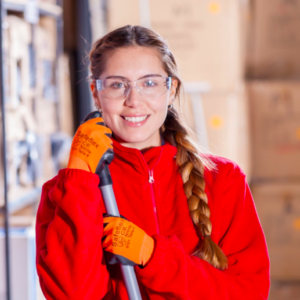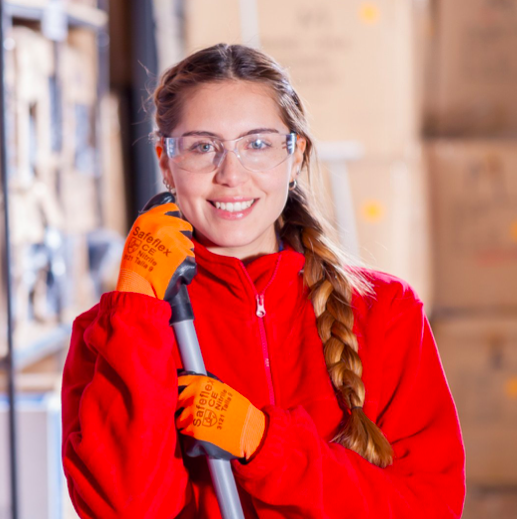Women AdvaNCe is a member of the NC Families Care, a coalition of over two dozen diverse organizations advocating for family-friendly workplace policies for working North Carolinians and their families, including paid sick and safe days, paid family medical and parental leave, pregnancy accommodations and living wages.
 With the United States engulfed in a pandemic since the first quarter of 2020, the heightened importance of over four million hand laborers and material movers has become evident. As many have been classified as essential workers due to the influx of online shopping and buyers “stocking up” on various items, their risk of exposure to COVID-19 has increased. While many businesses, organizations and companies have been at the forefront of their industries setting an example of how to navigate these unfamiliar waters, others have found themselves at the opposite end of the spectrum.
With the United States engulfed in a pandemic since the first quarter of 2020, the heightened importance of over four million hand laborers and material movers has become evident. As many have been classified as essential workers due to the influx of online shopping and buyers “stocking up” on various items, their risk of exposure to COVID-19 has increased. While many businesses, organizations and companies have been at the forefront of their industries setting an example of how to navigate these unfamiliar waters, others have found themselves at the opposite end of the spectrum.
Hired by her employer in May, as the severity of this new reality was beginning to unfold, “Simone,” a warehouse fulfillment specialist for an online retailer, had no reservations about accepting her new job offer. Referencing her initial interaction with the company, the safety measures they had enacted provided her with a sense that her well-being was of importance.
“I didn’t have any concerns due to the fact they were already taking precautions,” she noted. “For the interview, they had us sit out in our cars and whenever we got a text message saying we were next, we would go into the building. The six-feet policy was in place when we interviewed.”
Having recently relocated to North Carolina, Simone was excited about securing a job with a reputable company. Initially, her employer lived up to her expectations. She was pleased to witness the company implementing guidelines, proposed by the Centers for Disease Control and Prevention, as the number of Americans infected with the virus multiplied.
“Once COVID started getting to the point where it was out of hand, they told us to wear a mask all day except when you’re on break,” she recalled. “There was the six-feet rule and we were to try to wash our hands as much as possible. A new cleaning crew was hired to make sure the equipment is cleaned throughout the entire shift. I felt safe going to work.”
The company also notified their employees when someone at the distribution center tested positive for COVID-19. Anyone who had been in close contact with the infected person was required to be tested.
Confident of the safeguards being implemented, Simone didn’t experience any uneasiness until the raging virus came knocking at her door. In June, after being near a co-worker who tested positive, Simone had to be tested. At the time, she was informed there were at least three cases at her job.
Recognizing the burden this could place on their employees, the company executed a policy that allowed them to pay an employee for four days as they awaited results. In addition to the days that were covered, Simone used paid time off for two additional days. Before returning to work, she had to submit her negative test results to her supervisor.
After she returned, she noticed a shift.
“They stopped giving us the initial calls to let you know they had a case,” noted Simone. “They come up with excuses now about why they can’t give us the calls anymore. The protocols they had started taking were lacking. We have a board where we can write our thoughts and concerns.”
The responses to their concerns are written on another board. However, Simone doesn’t believe this method of sharing has been effective.
“We’re giving feedback and they’re not using it,” she said. “They just give us the answers and we can’t ask questions. It’s not a place where you can sit down and just talk to them. It’s frustrating.”
While the United States is experiencing a daunting surge in cases, the single parent, who keeps her daughter’s wellbeing at the forefront of her mind, is becoming increasingly wary about how the company is handling the crisis. In October, Simone was exposed, again to the virus. Unlike her first experience, she was informed by an outside source of the clusters within the building where she works.
“A week prior, I had gone to the emergency room about an upper respiratory issue and it wasn’t getting better,” she explained. “When I went back, they asked me where I work. I told them and they told me we were having a big outbreak. I was shocked!”
As they did before, the company paid her for four days as she awaited results. Simone also had to take paid time off again. In September, her employer started a policy where each employee would receive 80 hours of pay if they had to take time off due to a COVID-related issue. As of now, Simone has three hours of pay left under that policy. She’ll have to use her paid time off or sick leave going forward, if need be. With so much uncertainty still surrounding COVID-19, the lack of hours she would have covered, if she must journey down this route again, is a major concern for the weary employee.
According to a guide published by the National Partnership for Women and Families and National Employment Law Project, the company’s current handling of the pandemic, notably as it relates to emergency paid sick time off and paid family leave, doesn’t align with what they suggest as best practices for businesses. Simone agrees.
“It’s kind of hard to work with them when they’re not trying to work with us,” she lamented. “It’s not being taken as serious as it should. I feel like if we have that concern board, they should take into consideration we work here. They knew it would get worse before it got better. Why not prepare for these things? Have a plan A, B, C. There should be some type of adjustments.”
Although Simone can’t force anyone to respond to what’s going on the way she would like, she’ll continue to voice her opinion and protect herself, physically and mentally.
“I take my own separate precautions to be as healthy and safe as possible,” she proclaimed. “It’s not just affecting our health but our mentality. Not being able to see family or do the things we used to do on the regular. We just have to try to stay positive.”
 Kassaundra Shanette Lockhart is a freelance writer.
Kassaundra Shanette Lockhart is a freelance writer.

There are no comments
Add yours